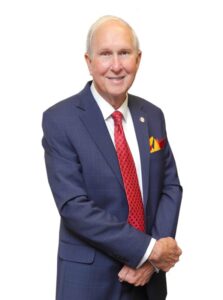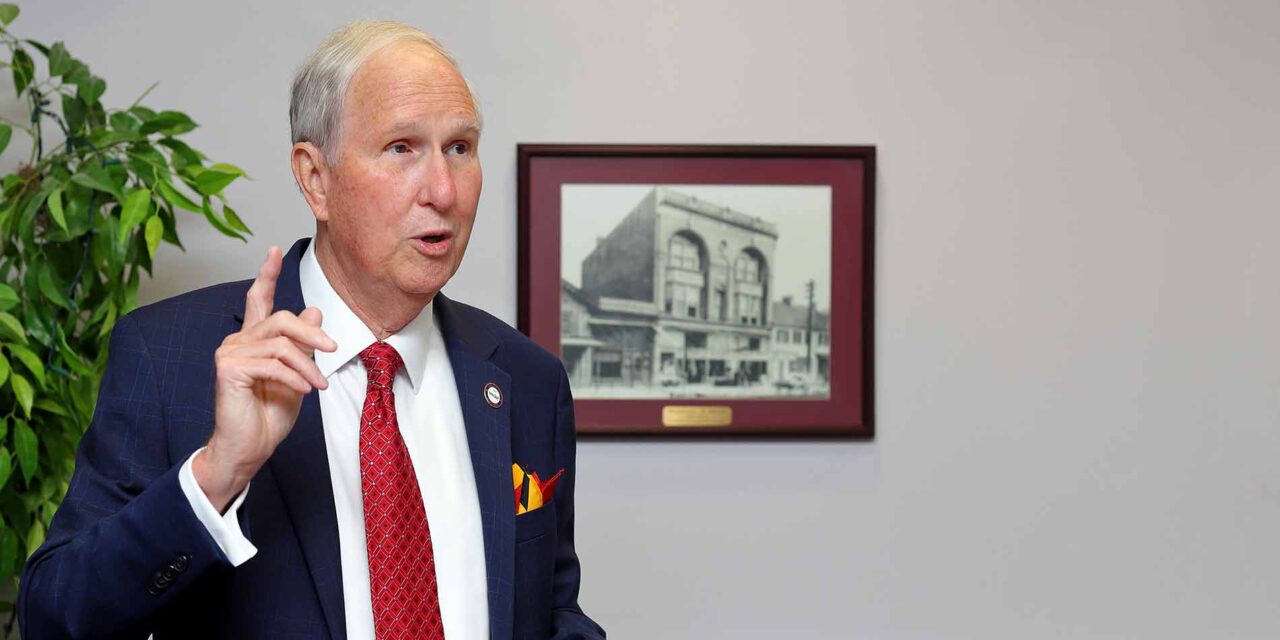John “Jack” Lyburn, Director Department of Economic Development
by Kym Byrnes, photography by Nikola Tzenov
Carroll County’s Department of Economic Development spent the past year and a half helping local businesses navigate through a global pandemic. With 20 years in economic development in Carroll County, Economic Development Director John “Jack” Lyburn said that the diversity of Carroll’s economy was an asset during the pandemic as many manufacturers and other critical employers remained fully operational. With an eye on continuing to expand high-tech manufacturing and information technology business in Carroll, Lyburn added that agriculture is a “silent giant” in Carroll County’s economic landscape. As local business continues to rebound from the coronavirus pandemic, Lyburn said that his team is excited to see unemployment numbers heading in the right direction and local business development projects continuing to gain traction.

“One of Carroll’s primary strengths is the diversity of our economy, and this really was an asset during the pandemic. Many of our manufacturers and other “critical” employers were fully operational throughout the pandemic.”
– JACK LYBURN
What is your background, how did you get into economic development?
I was raised in Baltimore City and moved to Carroll County 44 years ago. It was, and still is, a great place to raise a family.
I began my career at the Pantry Pride grocery store chain. I held several roles there, including director of operations, research, and finally comptroller. After leaving Pantry Pride I went to work at Manekin Corporation, where I was involved in commercial real estate development, brokerage, and property management. It was at Manekin, under the genius leadership of Richard Alter, that I learned how to finance a real estate development project. Robert Manekin taught me how to negotiate the Art of the Deal. Two great leaders in the Baltimore real estate industry!
After 11 years at Manekin I went to work as the vice president of leasing and brokerage for Kline, Scott Visco in Frederick County. I was then offered the director of economic development job here in Carroll County, where I stayed for 10 years. I left for a few years to start Lyburn & Associates, a local commercial brokerage in Carroll. I was then asked to come back to the director position — and I have been here for the last 10 years. In all, I have been involved in commercial real estate for over 32 years.
How does the Carroll County Department of Economic Development work to develop and grow the local economy?
The Department of Economic Development is organized into several components that work to grow the local economy. We have the Economic Development Administration, the Business & Employment Resource Center (BERC), Agriculture Development, Tourism, and the Farm Museum. Each office works to promote Carroll County assets within their individual focus. For example, Tourism works to attract visitors. To help drive traffic back to Main Streets post-COVID, Tourism has produced nine “main street” videos and placed 85 advertisements in publications. The award-winning Barn Quilt Tour, featuring 40 quilts, is another big attraction for the county. The Farm Museum hosts special events that bring visitors to our county. BERC works with our area employers on workforce development. They promote our skilled workforce as an asset for our county and help employers find suitable employees.
The Economic Development Administration works to create a positive business climate that will accommodate the expansion of existing industry and attract new industry to the area. We do this by acting as the county’s business advocate. We provide an array of services, including site and facility tours, research, financing packages, customized proposals, regulatory agency assistance, government liaison, workforce training, and development and business advocacy.
Our mission is to create wealth through capital investment and job creation. Our motto is “We change lives.” And we really do!
You have been involved in economic development in Carroll County for a couple of decades. Do you have any insights about how Carroll’s business community has evolved?
When I first started in Economic Development, Carroll County had not really marketed itself as a destination for business. Economic development relies heavily on relationship building — relationships with business owners, landlords, brokers, colleagues at the state level and other partners like Carroll Community and McDaniel colleges. When I became the director of Economic Development, I made a determined effort to make Carroll County a place that was not just a suburb of Baltimore but a viable business destination in itself. My staff and I became active in national and state economic development organizations and even sat as board members. We attended trade shows, seminars and professional trainings.
Relationships with Maryland Commerce, especially Tim Doyle, have helped make Carroll County a leader in state economic development efforts. I value the relationships that I have made over the years that have contributed to the county’s success.
My focus has always been on retention of existing businesses. It is much easier to retain a business that is already here than to spend efforts on luring an out-of-state business. We personally visit companies to check in on them. Business leaders know who to call when they need assistance or have an issue.
Over my years, Carroll County has diversified and grown from our mainly agricultural roots. I particularly have enjoyed watching the growth of our local manufacturing base. We have watched local manufacturers such as Strouse Corporation, Fairlawn Tool and Knorr Brake grow into national leaders in their industry.
We have worked to attract new companies to Carroll County as well. FR Conversions, Advanced Thermal Batteries and 310 Tempering are a few companies who have located to the county.
Carroll County really has become a desirable business location. We are conveniently located in a major Mid-Atlantic market within close proximity to the Port of Baltimore and BWI.
Overall, how did Carroll’s economy fare through COVID? Were there certain business sectors that were particularly hard-hit?
Nearly every business sector has been impacted by COVID. Our county commissioners reacted rapidly to the COVID situation and we were one of the first counties in the state to offer grants to small businesses, including sole proprietors, farms, nonprofits and home-based businesses. Through many grant opportunities from federal, state and local programs, my department has awarded over $10 million dollars to more than 2,000 local businesses just in the past year. I am fortunate to have such an amazing staff supporting me.
One of Carroll’s primary strengths is the diversity of our economy, and this really was an asset during the pandemic. Many of our manufacturers and other “critical” employers were fully operational throughout the pandemic. Several of our businesses pivoted their operations and began producing personal protective equipment.
Locally, the hospitality sector, including restaurants and accommodations, bore the brunt of the closures and capacity limits. Even now some continue to struggle with maintaining adequate employment. However, there was also good news from these industries as well. 1623 Brewing in Eldersburg is expanding by 11,000 square feet. Westminster Station opened with several national chains: Tropical Smoothie Café, Blaze Pizza and Jersey Mike’s subs.
While Carroll County is historically a farming community, many don’t think of agriculture as a large business component in Carroll County. How important is agriculture to Carroll’s business community and economic development?
Agriculture is a silent giant in Carroll County’s economic landscape, contributing more than $110 million in market value annually. The traditional side of agriculture is very visible — take a short drive around Carroll and you will see evidence of crop and commodity farming, raising livestock, nursery and more. However, agriculture as an industry is much more complex and encompassing. It includes and supports a variety of jobs from other industries, including tourism, transportation, research and biotech, education, manufacturing and more.
What does recovery look like for local businesses?
It depends on their sector. We have seen some manufacturers who are busier than ever trying to meet demand. Distribution continues to be a key factor in economic recovery. For example, Random House expanded by 1.2 million square feet. Many restaurants are reporting they are busy but are forced to limit operations due to lack of staff. Some businesses, such as hotels and B&B’s, are starting to see an increase in activity, but still not close to pre-COVID levels. The infusion of grant dollars was a tremendous source of relief to many businesses, but the impacts of closures will most likely be felt for some time.
Are there certain business sectors or types that Carroll County is targeting or particularly interested in expanding?
High-tech manufacturing is our “bread and butter.” We are also interested in growing business sectors such as information technology. While Carroll County doesn’t have the highways to support major distribution units, our residents are highly educated and often commute out of the county to work. Given that, and our significant investment in broadband infrastructure, I believe we have the building blocks necessary to attract this sector.
Traditionally, what are some economic indicators for how Carroll County is doing? Is it different during COVID recovery?
We monitor economic indicators such as the employment rate (including new jobs created) and the commercial/industrial tax base. Employment numbers changed during COVID. Like other jurisdictions, we saw unemployment rise. I am happy to report that the latest numbers show Carroll County at 3.9 percent, the lowest unemployment rate in the state.
Related to business development projects, revenues take a few years to realize. We work closely with our towns on many business park projects. We are continuing to work on developments such as the North Carroll Business Park, the Westminster Technology Park and of course Warfield at Historic Sykesville. After more than 20 years of planning, this property was purchased in 2018 by a development group and several new tenants have moved into the historic buildings, including Zeteo Tech and Alderson Loop. We are excited that the project has gained traction and are looking forward to continuing to market this unique property for commercial and industrial development.

